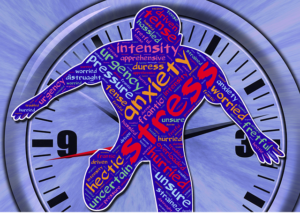Stress is undeniably a part of life. No one is immune to stress; stress doesn’t discriminate against age, ethnic group, sex, or socio-economic background. Whether you’re a baby waiting in frustration to be fed, or an executive anxiously anticipating an important business meeting, everyone experiences stress.
Stress is the emotional and physical response your body has when faced with a difficult situation or demanding circumstance.
What causes stress?
Stress is your body’s natural reaction to internal or external triggers, also known as stressors. External triggers are things that we have little or no control over and can be either positive or negative. These triggers include traffic, construction noise, natural disasters, the birth of a child, or an upcoming marriage. Internal stressors are self-induced negative thoughts and pressures such as trying to be perfect, unrealistic expectations, or self-pity.
What chronic stress does to your mind and body
According to the Mayo Clinic, stress can affect your body, your thoughts, and your feelings. Although everyone experiences some level of stress, not everyone reacts the same way to stress. Some people may experience physical signs, like headaches or high blood pressure, while others may experience emotional signs, like depression and mood swings.
Uncontrolled stress has consistently shown to contribute to many health problems such as heart disease, obesity, insomnia, diabetes, depression, and stomach upset.

How to keep stress in check
A common misconception about stress is that by eliminating it completely from your life, you’ll live a content and healthy life. This isn’t the case! Stress isn’t always a bad thing. Stress encourages us to grow and helps us to adjust to life’s constant changes. The key is learning how to manage it. It’s when stress is prolonged, persistent, and unmanageable that it causes the most damage.
Identify your triggers
Once you’ve identified your stress triggers, you can try to find ways to cope when they strike. If one of your triggers is construction noise while you’re working, think of ways to reduce the noise; wear noise-cancelling headphones, listen to soothing music, move to a quieter area, etc.
Trying to be all things to all people is exhausting and downright impossible. If you are a perfectionist you will know how stressful it is to continually strive to always be perfect at everything you do. Likewise, trying to do it all only heightens your level of stress.
Daily Relaxation
Healing therapies such as guided imagery, healing touch, yoga, and meditation have shown to have profound effects on relieving stress. These techniques work by calming the mind and body, slowing down your heart rate and blood pressure and relaxing your breathing.
Other simple ways to relieve stress include:
- Laugh more.
- De-clutter your home and work space. Your anxiety levels can rise by simply just looking at or being in a cluttered environment. A clutter-free space makes finding your keys or important document that much easier.
- Exercise, preferably outdoors. Being outdoors, breathing in the fresh air and listening to the sound your shoes make when striking the pavement or stepping through leaves can be an almost instant stress release
- Practice negative thought-stopping. Refuse to listen to your negative voice that is telling you “you can’t do it,” or “you’re going to fail.”
- Pat your dog or cat – animals are very therapeutic. They are non judgemental and accepting.
- Try aromatherapy – lavender and rosemary have shown to have a soothing and calming response on the body.
- Say no! When you’re becoming overwhelmed with a jam-packed schedule, learn to delegate when you can and to kindly decline invitations.
It is much easier to try and keep your stress levels under control, rather than try to deal with the negative consequences. If you have any tips that work for you if reducing your stress levels, leave a comment below.

